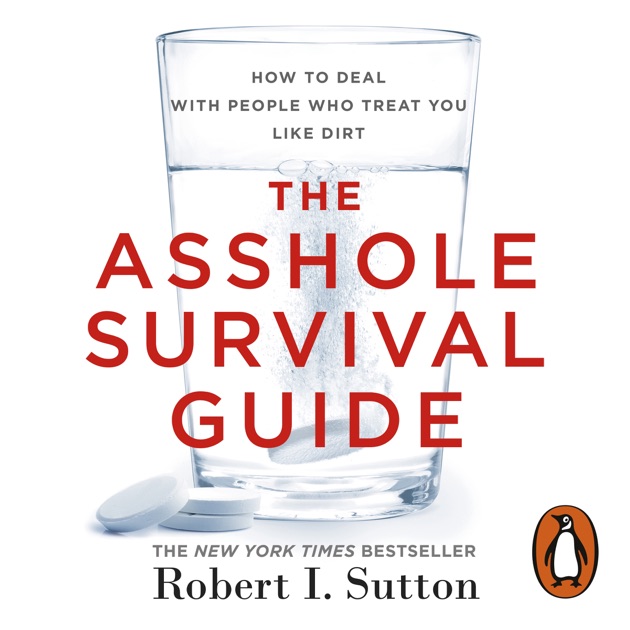
Robert I. Sutton
A book review published in The Whistle (Newsletter of Whistleblowers Australia), No. 100, October 2019, pp. 10-11
IS THERE SOMEONE at your workplace who is obnoxious? Someone who is rude, contemptuous, continually belittling others, inconsiderate, foul mouthed? Someone others seek to avoid?
If so, what should you do? Try to get along? Get away? Fight back? Quit?
The question is more acute if there are lots of these obnoxious workers, and if one of them is your boss.
Robert I. Sutton is a management researcher at Stanford University. Normally he writes about building better workplaces. Then he wrote an article about “assholes” — the US spelling of “arseholes” — and, because it was so popular, a book titled The No Asshole Rule. Sutton argued that workplaces would become much more productive, as well as more satisfying, by curbing bad behaviour. This could be done by not hiring arseholes, not tolerating them and, if necessary, getting rid of them.

Robert I. Sutton
The No Asshole Rule turned out to be Sutton’s most popular book, by far. As a result, he received 8000 emails from readers, many of them providing further stories about arseholes in the workplace. There was also a common refrain: correspondents wanted to know what to do about the co-workers who were causing them so much grief.
So Sutton decided to write another book about arseholes, this one called The Asshole Survival Guide. It provides advice about what to do. The book has lots of stories of toxic behaviour and ways people dealt with it. The stories make for entertaining reading as well as making the lessons much more digestible.
The issue is important. Sutton writes, “The list of damages done by workplace assholes goes on and on: reduced trust, motivation, innovation, and less willingness to make suggestions; increased waste, theft, absenteeism, and surliness.”
There are many varieties of arseholes. To be fair, we shouldn’t refer to someone as an arsehole: they are simply behaving in a bad way. Maybe they aren’t like this all the time. Because nearly everyone behaves inappropriately some of the time, it’s not just a question of pointing the finger at a few bad apples. We need to be aware of our own bad behaviour.
Sutton says the first task is to identify bad behaviour and decide whether it’s someone’s regular way of interacting or, instead, just an outburst due to having an off day. You also need to decide how serious the problem is.
If there is an arsehole at your workplace, causing you grief, what are the options? One possibility is to leave: quit the job or get an internal transfer. However, some people are unable to leave for financial or other reasons.
A less drastic option is to reduce your exposure to the arsehole. You might respond to emails less promptly, try to be inconspicuous at meetings, or find a thick-skinned co-worker to be a buffer. Some middle managers see it as their role to protect their subordinates from abuse from the CEO: these managers take the flak and reduce the wider damage.
Another option is to change the way you respond mentally to toxic behaviours. You might imagine that the boss’s words of abuse are part of a song, or marvel at the imaginative put-downs, or count the number of minutes and measure the volume of a tirade. The idea here is to learn to respond in a different way, so you feel less upset. It’s also important not to dwell on incidents, going over and over them in your mind. The arsehole probably has forgotten all about what happened; you should be able to do the same.

Then there is the option of fighting back. There are various ways to do this. One is to return fire, responding to abusive comments with your own abusive comments. Sutton warns that this is very risky, because then you might be seen as the arsehole.
Another method of fighting back is to use humour to deflate nasty comments. You might also make a complaint after collecting plenty of information. This is not a reliable method, because the arsehole might have allies, and the whole workplace might be infected with arsehole behaviour. As Sutton notes, arseholes breed more arseholes. You are at risk of becoming infected.
This is a brief overview of some of the ideas in The Asshole Survival Guide. There are lots of complications. If you have a problem at your workplace, it’s worth reading the book to get ideas, learning from what others have said and from what researchers have discovered. Yes, there are researchers studying civility in workplaces.
There is a partial overlap between the hostile treatment of whistleblowers and dealing with arseholes. These are not identical problems. Many whistleblowers are subject to bullying, ostracism and various types of reprisals. These might be considered arsehole behaviours. On the other hand, people called workplace arseholes — the repeat offenders — can make life a misery for anyone affected, not just whistleblowers.
Sutton says rules and laws aren’t all that useful. In a list of resistance techniques that he says are likely to fail or backfire, #7 is “Ask crooked people and systems for help.”
Beware of people in HR, legal, senior management, or law enforcement with big incentives to protect the assholes in power and none to fight for you. Gretchen Carlson at Fox News provides a cautionary tale. New York magazine reported in September 2016 that when she complained to her supervisor about condescending cohost Steve Doocy, Chairman Roger Ailes got wind of it and told Carlson that she was “a man hater” and a “killer” who “needed to get along with the boys.”
If you’re thinking of speaking out in the public interest, you are at risk of being treated badly at work. This means you can learn from The Asshole Survival Guide how to assess the behaviours of your co-workers, consider options and prepare for reprisals. Not surprisingly, many of the techniques described by Sutton — leaving, avoidance, mental skills and fighting back — can be quite useful to whistleblowers.

Brian Martin is editor of The Whistle.
Brian Martin's publications on suppression of dissent